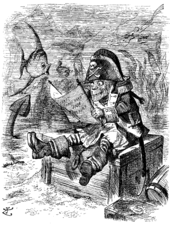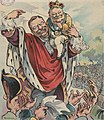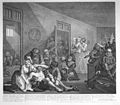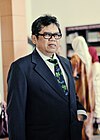Portal:Cartoon
The Cartoon Portal

A cartoon is a type of visual art that is typically drawn, frequently animated, in an unrealistic or semi-realistic style. The specific meaning has evolved, but the modern usage usually refers to either: an image or series of images intended for satire, caricature, or humor; or a motion picture that relies on a sequence of illustrations for its animation. Someone who creates cartoons in the first sense is called a cartoonist, and in the second sense they are usually called an animator.
The concept originated in the Middle Ages, and first described a preparatory drawing for a piece of art, such as a painting, fresco, tapestry, or stained glass window. In the 19th century, beginning in Punch magazine in 1843, cartoon came to refer – ironically at first – to humorous artworks in magazines and newspapers. Then it also was used for political cartoons and comic strips. When the medium developed, in the early 20th century, it began to refer to animated films that resembled print cartoons. (Full article...)

In print media, a cartoon is a drawing or series of drawings, usually humorous in intent. This usage dates from 1843, when Punch magazine applied the term to satirical drawings in its pages,[1] particularly sketches by John Leech.[2] The first of these parodied the preparatory cartoons for grand historical frescoes in the then-new Palace of Westminster in London.[3]

Selected article -
The Simpsons is an American animated sitcom created by Matt Groening for the Fox Broadcasting Company. The series is a satirical parody of the middle class American lifestyle epitomized by its titular family, which consists of Homer, Marge, Bart, Lisa, and Maggie. The show is set in the fictional town of Springfield, and lampoons many aspects of the human condition including American culture, society, and television. Since its debut on December 17, 1989, the show has broadcast 768 episodes. The Simpsons has won dozens of awards since it debuted as a series, including 27 Primetime Emmy Awards, 30 Annie Awards and a Peabody Award. Time magazine's December 31, 1999 issue named it the 20th century's best television series, and on January 14, 2000 the Simpson family was awarded a star on the Hollywood Walk of Fame. The Simpsons is the longest-running American sitcom, the longest-running American animated program and it surpassed Gunsmoke as the longest running American primetime entertainment series. Homer's annoyed grunt "D'oh!" has been adopted into the English lexicon, while The Simpsons has influenced many adult-oriented animated sitcoms.
Selected character -
Bart Simpson is a fictional main character in the animated television series The Simpsons and part of the eponymous family. He is voiced by actress Nancy Cartwright and first appeared on television in The Tracey Ullman Show short "Good Night" on April 19, 1987. Bart was created and designed by cartoonist Matt Groening while he was waiting in the lobby of James L. Brooks' office. While the rest of the characters were named after Groening's family members, Bart's name was an anagram of the word brat. After appearing on The Tracey Ullman Show for three years, the Simpson family received their own series on Fox, which debuted December 17, 1989. He has appeared in other media relating to The Simpsons; including video games, The Simpsons Movie, The Simpsons Ride, commercials, and comic books; and inspired an entire line of merchandise. Hallmarks of the character include his chalkboard gags in the opening sequence; his prank calls to Moe the bartender; and his catchphrases "Eat my shorts", "¡Ay, caramba!", and "Don't have a cow, man!" Nancy Cartwright has won several awards for voicing Bart, including a Primetime Emmy Award in 1992 and an Annie Award in 1995. In 2000, Bart, along with the rest of his family, was awarded a star on the Hollywood Walk of Fame.
Did you know... -
- ...that 1999's Scooby-Doo! Mystery of the Fun Park Phantom was the first commercial Scooby-Doo computer game for the Windows platform?
- ...that the Young Justice episode "Independence Day" introduces a younger version of the DC Universe?
- ...that after bad reviews, the distributors of the 1992 animated film The Princess and the Goblin used enthusiastic comments from children in its promotional material?
- ...that Ed, Edd n Eddy's TV movie series finale, Ed, Edd n Eddy's Big Picture Show, premiered on November 8, 2009, and achieved high ratings success for Cartoon Network?
Selected list -
There have been 131 episodes of Ed, Edd n Eddy, an animated comedy television series created by Danny Antonucci and produced by Canada-based a.k.a. Cartoon. The series debuted on Cartoon Network in the United States on January 4, 1999, and ended on November 8, 2009, with the premiere of the series finale film Ed, Edd n Eddy's Big Picture Show. The series was originally planned to air for four seasons; however, Cartoon Network ordered two additional seasons and three holiday-themed specials as a result of its popularity. Reruns continue to air on Cartoon Network, including airing as part of the revived block Cartoon Planet. The series revolves around three adolescent boys collectively known as "the Eds", who live in a suburban cul-de-sac. Unofficially led by Eddy, the Eds constantly try to scam the fellow cul-de-sac children in order to purchase jawbreakers. The Eds' plans usually fail and leave them in various predicaments. The award-winning series garnered generally positive reviews, and remains the longest running original Cartoon Network series and Canadian-made animated series to date.
General images -
Selected biography -
Lat is a Malaysian cartoonist whose work earned him the honorific title of datuk. He was born on 5 March 1951 in a village in Perak, Malaysia, and started supplementing his family's income at the age of nine by submitting his comics to magazines and newspapers. Four years later, he published his first comic book. In 1970, Lat left school and became a crime reporter while continuing his cartooning sideline. His comic about the Bersunat—a circumcision ceremony all Malaysian boys of the Islamic faith have to undergo—made a great impression on his newspaper's editor-in-chief. As a result, Lat became an editorial cartoonist. As he gained popularity through his cartoons in Malaysia, he published his autobiography in the form of two graphic novels—The Kampung Boy and Town Boy. The Kampung Boy was a huge success and gained him international renown. It is published in various countries around the world in several languages. Lat's cartoons provide an unbiased and humorous insight on the lives and culture of Malaysians, who consider him one of their most trustworthy citizens. His admirers include American cartoonists Sergio Aragonés and Matt Groening.
Subcategories
WikiProjects
- Main projects
- Arts • Animation • Comics • Entertainment • Visual arts
- Related Projects
- Anime and manga • Biography • Film • Fictional characters • Media franchises • Music • Television • Video games
Selected quote -
Topics
- Comic book
- Comic strip
- Digital comics
- Graphic novel
- Mobile comic
- Motion comics
- Trade paperback
- Webcomic
- Animator
- Animation director
- Animation studios
- Animation film festivals
- Feature-length films
- Short films
- Television series
- Computer-animated films
- Stop-motion films
- Traditional animation
- Limited animation
- Rotoscoping
- Stop Motion
- Clay
- Cutout
- Graphic
- Model
- Object
- Pixilation
- Puppetoon
- Computer animation
- Flash animation
- PowerPoint animation
- SVG animation
- Cel-shaded animation
- Crowd simulation
- Morph target animation
- Motion capture
- Non-photorealistic rendering
- Skeletal animation
Things you can do

- Requested articles: Fenwick (comics), Khimaera (comics), Mutant Underground Support Engine, Bruce J. Hawker, Marc Dacier, Hultrasson, Frankenstein Comics, Dave Johnson (comics), Paco Medina, Dappere Dodo, New Adventures of the Space Explorers, Habatales, Musical Box, Foo-Foo (TV series), Bonne nuit les petits, The Adventures of Lariat Sam, More...
- Images and photos needed: Request images that are needed from Wikipedia requested images of comics and animation to included in each articles.
- Stubs: Work on stubs in articles in Comics and Animation stubs.
- Infobox: Add infobox that are needed from Category:Comics articles without infoboxes and Category:Animation articles needing infoboxes in articles.
- Deletion sorting: Please see the collection of discussions on the deletion of articles related to comics and animation - compiled by WikiProject Deletion sorting
Related portals
Associated Wikimedia
The following Wikimedia Foundation sister projects provide more on this subject:
-
Commons
Free media repository -
Wikibooks
Free textbooks and manuals -
Wikidata
Free knowledge base -
Wikinews
Free-content news -
Wikiquote
Collection of quotations -
Wikisource
Free-content library -
Wikiversity
Free learning tools -
Wiktionary
Dictionary and thesaurus
More portals
Sources
- ^ Punch.co.uk. "History of the Cartoon". Archived from the original on 2007-11-11. Retrieved 2007-11-01.
- ^ Adler & Hill 2008, p. 30.
- ^ "Substance and Shadow: Original Editorial Accompanying "Cartoon, No. I"". Victorian web.org. Retrieved 29 October 2023.









































